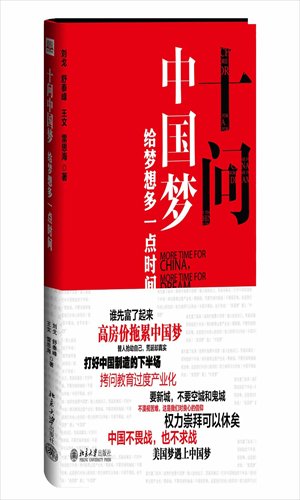HOME >> OP-ED
Chinese dream needs constructive discussion and implementation, not just slogans
Source:Global Times Published: 2013-12-5 19:33:01

More Time for China, More Time for Dream
The guiding ideologies of each generation of Chinese leadership can become popular as soon as they are officially proposed. They have also been widely regarded as the major force that empowers China's development at a particular period of time.
When newly elected Chinese President Xi Jinping outlined his doctrine of the Chinese dream earlier this year, academics and media outlets in China quickly began interpreting it.
At least for now, the Chinese dream, a new set of ideals that foreshadows the future of China's development, is still a framework which needs to be improved. This is why many top-notch experts are trying to build upon this ideology.
But most interpretations, which have been converted to books, follow the same path of emphasizing how to build this theoretical structure. Such a top-down paradigm is making these interpretations of the Chinese dream lack readability to most ordinary members of the public.
Starting from the question "What does the Chinese dream mean to us," a book called More Time for China, More Time for Dream provides a distinctive perspective to explore this new ideology.
The four authors of this book all have diverse experience in the mainstream media and are pioneers at the forefront of Chinese public discussion.
Unlike those serious theorists, the authors are used to facing concrete issues, thinking from the bottom to the top, from the specific to the general.
This book was jointly written by Liu Ge, commentator for the CCTV finance channel and a columnist for various prominent print media, Shu Taifeng, former chief commentator and senior journalist for various mainstream magazines, Wang Wen, executive dean of the Chongyang Institute for Financial Studies at the Renmin University of China and former chief opinion editor of the Chinese edition of the Global Times, and Lei Sihai, an expert in international relations for China Radio International and op-ed director of The News of the World.
The biggest distinction of the book is the 10 questions it asks. These questions are not only used as the framework for the book, but also set the tone for the whole book - that the Chinese dream will never be realized if the most urgent issues, whether they are related to people's livelihoods or international strategy, cannot be properly addressed.
The 10 questions are very carefully chosen, trying to condense all varieties of problems into them. These questions focus on people's livelihoods, finance, economic transformation, education, urbanization, public morality, rule of law, the population and the environment, war, and diplomatic relations.
Although each question seems to be specific and not closely related to the others, they are actually the 10 key issues that connect all kinds of social problems in China.
Without proper handling, these problems will probably trigger a domino effect, and the ongoing reform, especially in the pursuit of Chinese dream, will probably amount to nothing.
Authors focus on their own specialties. For example, Liu Ge, as a professional in finance, suggests that Chinese companies should put their priorities not in seeking profits, but on how to find mutual interests with local communities, such as how much employment they can create for local residents.
Meanwhile, Wang Wen, as a leader of one of China's leading think tanks, suggests that as China spreads the ideology of Chinese dream among the international community, it is important to amplify the voices of elites, which are represented by scholars, the National People's Congress, and government officials.
This is a book which can be appreciated by both serious scholars and ordinary people. By revealing the current problems, this book provides a much more down-to-earth approach to exploring the Chinese dream.
Posted in: Fresh off the Shelf, Viewpoint